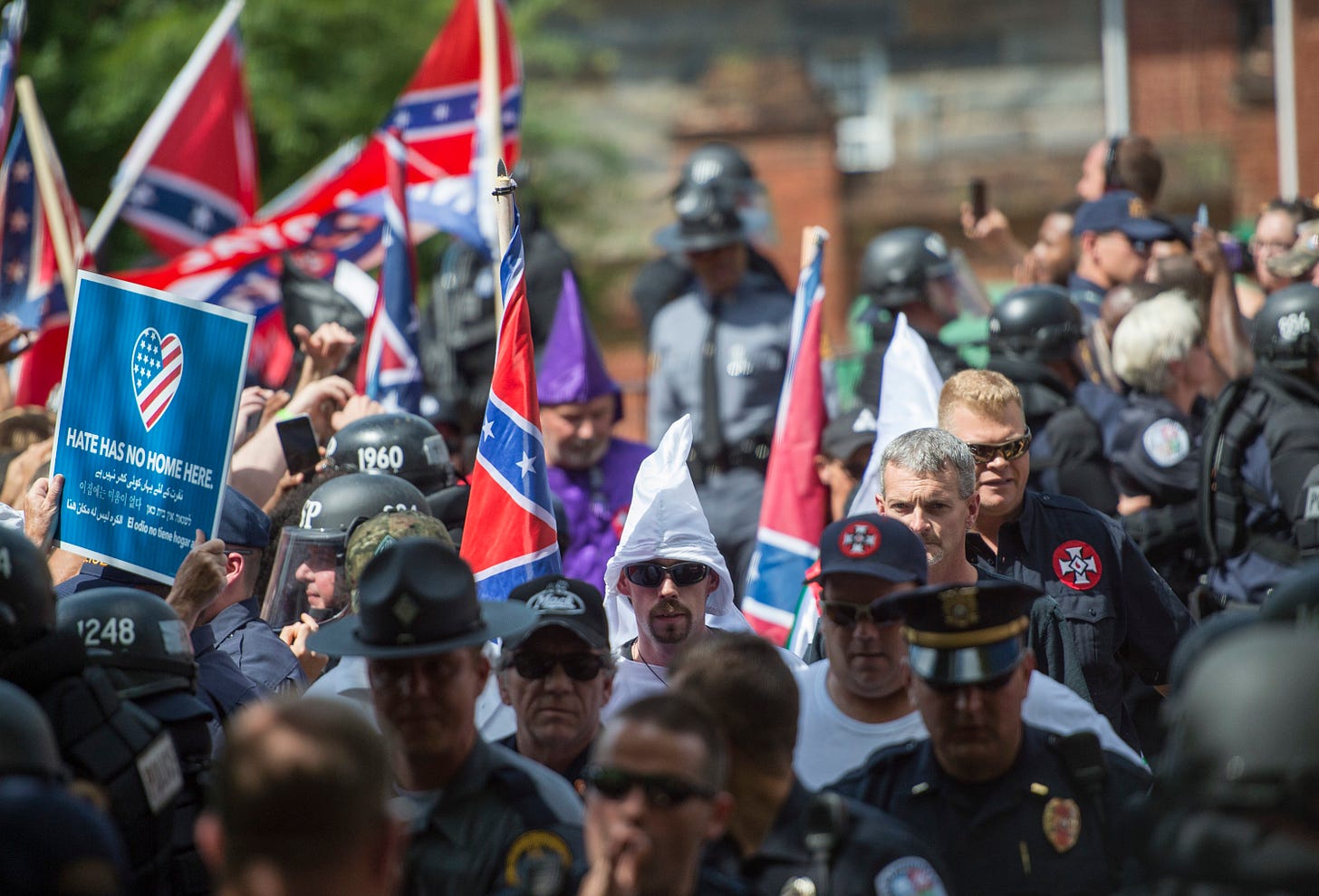All the Disturbing Parallels Between Radical Islam and White Nationalism
The scale is smaller, but the fundamentals are all the same.

If you're going to read one piece about the El Paso massacre, it should be this one from Robert Evans, who has been monitoring 8chan for a long while now.
It is difficult to look at what is going on in 8chan and find meaningful differences between the way ISIS and other arms of radical Islam have used social media to create animus and recruit terrorists.
Yes, this is about white nationalism, not Islam. Yes, the scale is smaller.
But stripped down to the fundamentals, what's going on is the same: An internet community where people spread a politicized ideological agenda, call for acts of terrorism, and then celebrate terrorist acts.
If you want to have your head snapped back, go take a look at this graphic from Axios showing the progression of mass murders since Columbine. The uptick from 2015 until today is gobsmacking.
But also not surprising.
What happens if you extend the analogy outward? If the new spate of white nationalist terrorism is a smaller-scale version of Islamic radicalism, then what else is going on in the culture?
Think back to the days immediately after 9/11. George W. Bush insisted publicly that Islam was "a religion of peace." Do you remember why he did that?
Because he believed that the only way to defeat Islamic terrorism was for Islam to reform its views from within. And the best way to empower the moderate reformers within Islam was to not categorize the problem as a clash of civilizations.
Was this a wise move? I don't think history's jury has a verdict on that yet.
But whether or not it was wise, Bush did demonstrate a clear-eyed view of the multilevel matrix within Islam that contributed to terrorism.
At the top you had actual shooting terrorists—the Osama bin Ladens and Ayman al-Zawahiris of the world. Beneath them you had radical thought leaders, like Sayyid Qutb, who create the ideological framework that allows terrorism.
Then there are the state sponsors, such as the Taliban government of Afghanistan, circa 2000. And the private sponsors, who donate money to "charity" organizations—where the dollars eventually wind up funneling down to the terrorists.
And then there is the soft buffer of public support. People like Anjem Choudary, who don't kill people themselves, but who apologize for the killers and explain why they aren't the real bad guys. The Choudarys of the world are a distinct minority. But they exist. And beneath them is another layer of sympathy from the leadership class that will issue pro-forma denunciations of violence while continuing to preach ideas and promote grievances which stoke the fires.
And because of these actors, you see attitudes in some parts of the Muslim world which are frighteningly open to terrorism, even if the members of the public aren't willing to carry out terrorist acts themselves.
For instance, a Pew survey from 2013 found that 26 percent of Muslims in Bangladesh believed that suicide bombing in defense of Islam was "sometimes or often justified." In Egypt the percentage supporting that view was 29 percent. In Morocco, 9 percent. Tunisia, 12 percent. Malaysia, 18 percent.
You see what I mean here: Islamic radicalism doesn't perpetuate itself because there are a few thousand men who want to commit mass murder. It persists because there are pockets of the world where the culture is such that millions of Muslims think that terrorism is sometimes justified.
Which brings us back to El Paso. White nationalism is a thing in America, again. This is not new, exactly. We had the KKK and very real, very dangerous white nationalists in operation—with all of the attendant layers of support in the culture—60 or 70 years ago.
It has now re-emerged. And while this growth is still in its early stages, the reemergence is real. Anyone who will not concede that point is either foolish or operating in very bad faith.
You can see all of the analogs to the Islamic terror food chain, in miniature. White nationalists have their terrorist actors, such as Patrick Crusius. They have their ideological theorists, such as Richard Spencer, who provide the intellectual framework for terrorism without getting their hands dirty. Russia is not exactly a state sponsor, but more like a state-sympathizer.
If you look around what has become mainstream American conservatism over the last four years, you see some people who look like Anjem Choudary, insisting that there is no such thing as white nationalism. (See Dennis Prager twist himself into a logic pretzel here, for example.) And then a larger number of people who mouth de minimis condemnations of the actual terror acts and then turn around and continue to stoke the fires of racial grievance with abject nonsense. Like Amy Wax.
And while it should go without saying, it does not help to have, as the president of the United States, a man who claims that Mexican immigrants are murderers and rapists. The statement contains perhaps a kernel of truth, in so much as there are criminals in any large group of people. But it's certainly not true that immigrants are statistically more likely than any other group to commit crimes. And in fact, the truth is the opposite: They are less likely to commit crimes than native-born Americans.
Maybe such statements are accidental. Maybe they are merely the product of oafishness or impetuousness or vulgarity. Maybe they're meant to be taken seriously, but not literally. Or the other way around. After all, the president unequivocally condemns violence. (Except against his political opponents.)
Maybe, if you squint very, very hard you can talk yourself into believing that Donald Trump has not contributed to the rise of white nationalism.
But no reasonable person could believe that the effect of his presence in American public life has checked it.




